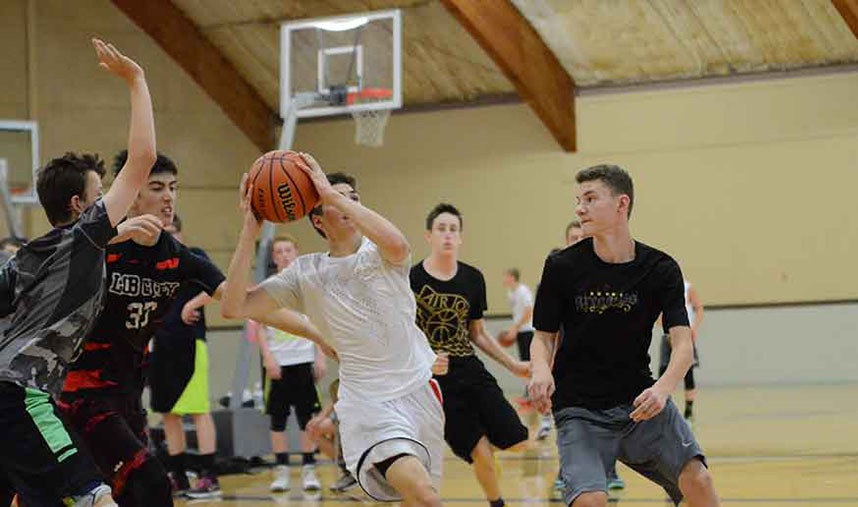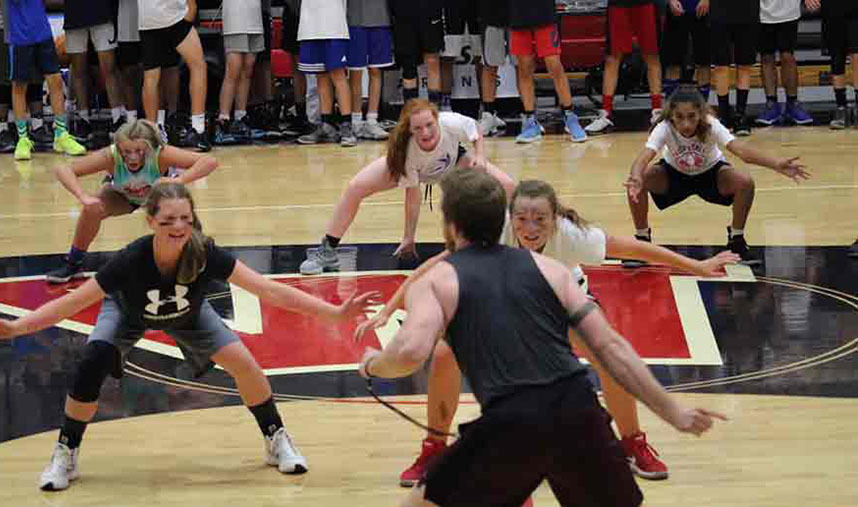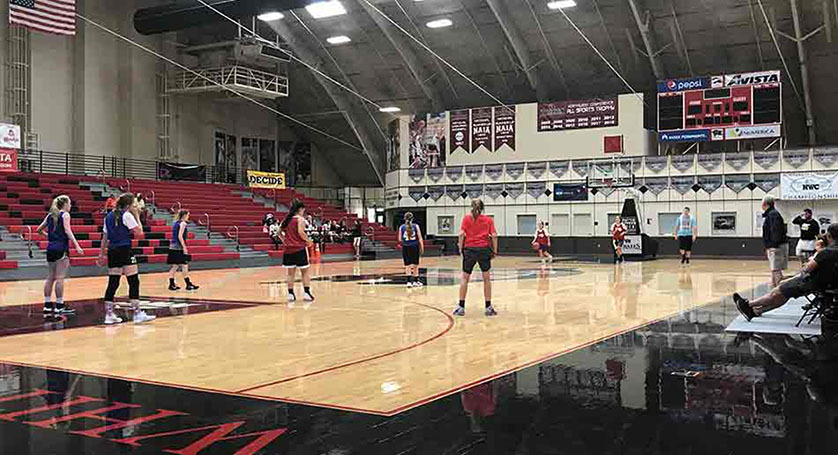March 30, 2021 | Tagged Leadership
Basketball Servant Leadership Series- Conceptualization
Servant Leader Series: Conceptualization—the Ability to Dream Big and then Follow Through
“We are caught up in a paradox, one which might be called the paradox of conceptualization. The proper concepts are needed to formulate a good theory, but we need a good theory to arrive at the proper concepts.”- Abraham Kaplan
NBC Basketball continues with the sixth character quality of a servant leader. Servant leadership is a leadership philosophy that simply believes leaders should make others better as defined as more healthy, wiser, freer, more autonomous, and better able to serve others. Conceptualization is the ability Walt Disney had standing in an Anaheim strawberry field and imagining all the people around the world coming to Disneyland. His ability to see the big picture as well as actuate the steps necessary for the completion of this big picture shows just how rare and difficult the skill of conceptualization is to develop.
The greatest tool necessary for this character quality as a leader is imagination. Your ability to visualize in your mind’s eye something that hasn’t yet been created. Conceptualization gives you the blueprint to your imagination.
Why Conceptualization Matters in Basketball
Research on professional basketball players found separation in those who had the talent to make it in the NBA or WNBA where some went on and some did not. One of the biggest findings was the certainty a player could play at that level and could imagine themselves there. Now, many of us have imagined ourselves doing many remarkable things but the difference is that this type of imagination is a fantasy, not a future vision. Players who had the skill level to play in the NBA who also had the characteristic of conceptualization made it more often than players who had the talent but didn’t have the ability to conceptualize themselves there.
Let’s take a practical basketball example. NBC Basketball's hometown team is Gonzaga (with one of our former campers – we can’t tell you who, but if you understand our devotion to teaching great shooting you might be able to guess). Gonzaga has never won a final four. One of the biggest obstacles to a championship win for a number one seed is the simple obstacle that they have never won it before. This unconscious collective ceiling once broken paves the way for future teams to not only imagine winning the final four but being able to actualize the dream.
In the same way, a student going to college for the first time has a different conceptualization experience than a student whose family has attended college for many generations.
This is one of the reasons you see success in students who have former players who are parents. The parents can help demystify the overall path to excellence on the court with concrete steps to make it there.

How to Build Your Conceptualization
Obstacle: You can’t know what you don’t know.
Our vision and specifically the practical steps to achieve your dreams must be bigger than yourself. Your own limitations serve to limit the big dream.
The Solution: Quality mentors provide insight into how big dreams are imagined and then actualized. One new coach asked a veteran coach to sit on her bench, she struggled to see the game from the vantage point of the expert. Her openness gave her not only the advantage of the novice, anew, fresh perspective but she also gained the knowledge of the expert whose intuition and insight had been forged through thousands of hours.
Action Step: Who is your mentor, (not a role model). This person has access to know your life and has the acumen to help challenge you in an effective way to dream big and follow through.
Obstacle: Your perception isn’t necessarily reality.
Solution: We gain a better perspective by including a variety of diverse points of view. New innovations and ideas come from pairing new or different understanding to awaken into better and best practice. For example, basketball needs a revolutionary training update—a new conceptualization on the training of athletes. Look at talent development in the arts. No one wants to watch a kid struggle playing a piece on the piano every week. This talent building should be done so that the fundamentals, musicianship, and insight into piano are solidified and allow true performance to emerge. The same is true for basketball, too much time is wasted in the younger ages playing five on five. Too many kids miss out. The complexity of the sport, the role of spectators, the expectations of coaches slow down the skill acquisitor of basketball fundamentals. Kids that have money or connection to the best teams in the city, dominate blowing out teams by 30 or 40 points which is ego-inflating for some and discouraging for others. If sports could learn from the arts how to build fundamental talent in ways that build the experimental flexibility of jazz or seasoned musician, the basketball deficits we are seeing throughout the country would be reduced.
Action Step: Take something you routinely do. How does do you make sense of this with your bigger life picture? Does what you are currently doing really contribute to reaching your goal? Are there other industries or places that have the better success that you can learn from?
Obstacle: Personal bias
Solution: Big and bold visions and ideas most often come from people outside the traditional point of view. “We’ve always done it this way,” is one of the ways to calcify ideas and innovation. Active open-mindedness through a willingness to question, struggle, wrestle, help us to challenge our own personal biases and come to innovative points of view. Willingness to humble ourselves especially when we assume we are experts allows us the ability to think flexibly and expand our points of view. Experts in taxes are twice as slow in implementing new tax laws as those who are novices. Our expertise can give us vast knowledge and intuition but also make us less likely to try something new or to question our own ideas.
Action Step: Take your belief about yourself and challenge your construct. For example, if you believe: I am a good shooter then evaluate that by the outcome of your shooting. Another example, I have been playing basketball since third grade- therefore I am a skillful player. That may or may not be true. What are you using to evaluate your ability?
Consider: I am a good friend—what makes you one? I am a good listener—how do you know? I am smarter than average—what is your measurement? I am humble—of course, you are!

A Message to Coaches About Conceptualization
Few of us could conceptualize the challenge Covid-19 has presented to coaches and players. Feeling discouraged, frustrated, confused, and overwhelmed are natural emotions when life throws us a challenge we didn’t foresee and demands tough decisions from us that we haven’t made before. Here are some helpful tools to navigate difficulties of this magnitude.
Use conceptualization to imagine how you would like to live and coach in difficulty. Find examples of coaches who have overcome significant obstacles in their path.
Bubble-wrap all your relationships and yourself in grace and kindness. Your grace is more important right now than your intensity.
Energy is a barometer of health. Our entire society is like a person who has been ill for a long time. Just doing normal life will take some adjustment. Respect your energy—it isn’t infinite and needs refueling.
Speak life to your kids. Kids are down, discouraged, and wrestling with existential angst. Your love and encouragement are healing right now much more than your judgment and scrutiny.
A "healthy you" is the best gift you can give your team. This means spiritual, relational, physical, and emotional wellbeing. If you have a deficit in all of these, start with spirituality, it is the foundation for all the rest. God invites us to come to Him on empty and He will fill us with what we need.

A Message to Parents about Conceptualization
If you want to read a good book, check out James McBride's Color of Water. It’s a beautiful tribute to the complexity of life and the will to overcome hardships for our children. It addresses well this idea of servant leadership as a parent--- to have a healthy overall conception of each child. Your view of your child influences your thoughts and words. For example, consider this parent’s point of view of their son, “He’s smart but he hates school and frankly is lazy and will end up wasting his life.” Is this honesty or is this disappointment that this child isn’t living up to the parent’s expectations? How does this son feel hearing his parent speak this way? How would a son overcome this declaration? Sadly, the parent is unconsciously cementing this future into the child’s life.
Conversely, consider this parent. “My son is a fifth-grader, and he is the best shooter on his team, he’s looking to play at Gonzaga and his coach thinks he can get there.” The parent also thinks this is an effective way to speak—it is positive, it is promoting a good big picture, but it is lacking in wisdom. Pre-speaking future talent that far from the goal is a recipe for disaster. What happens if the son gets injured, has a tough season, goes through a change of heart, doesn’t grow taller?” The ambition of the father’s words can become a shameful reminder of not measuring up.
Dreaming big for our children in externals is dangerous. Dreaming big in internals is powerful. Conceptualization to help your son or daughter build wisdom, integrity, honesty, meaningful faith, loving friendships and relationships and resiliency in hardship are gifts that will serve your child forever.